James Nestor, BREATH: The New Science of a Lost Art
No matter what you eat, how active, or how health-conscious you are, none of it matters if you’re not breathing properly. Our most essential function has been overlooked by science, undervalued by doctors, and neglected by everyone else. Luckily, as James Nestor reveals in his new book BREATH: The New Science of a Lost Art, cutting-edge science is revolutionizing our understanding of this missing pillar of health. As an author and journalist for Outside, Scientific American, The Atlantic, and more, covering science and extreme sports, Nestor was driven to answer seemingly simple questions he couldn’t find in any medical textbook. He wanted to understand why he and 90% of the modern population has crooked teeth? Why are humans the only species on the planet that snores and suffers from myriad respiratory maladies like asthma and allergies? Why are these problems increasing every year?
The answer is in how we breathe. Not since Michael Pollan’s Omnivore’s Dilemma has a book been so smart, so well- researched, so compelling in explaining the science of something right in front of us, yet so misunderstood and overlooked in modern health. Your bad teeth, your blood pressure, your weight, your sleep, and your immune system are all compromised because of how you breathe. Nestor, the brilliant mind hailed by the Wall Street Journal for his “fascinating, informative, exhilarating” writing, set out on a decade-long quest to find out where our breathing went wrong—and how to fix it.
Over the past few millennia, shifting diets and lifestyles have changed the human head: shrunk our mouths, flattened our faces, plugged our noses, and collapsed our airways. As a species, we’ve lost the ability to breathe correctly. Nestor found scientists and renegade respiratory researchers who are right now diagnosing and developing ways to reverse this damage. This group is rediscovering methodologies from ancient cultures to restore our breathing, and in return, transform our health.
Nestor practiced these breathing techniques himself to understand them from the inside. He even enlisted in a 21-day Stanford University experiment to have his nasal cavities plugged and had his mouth taped shut in an effort to test if the pathways through which we breathe affect our health. (They certainly do.) This experiment, and others, ultimately helped Nestor cure decades of respiratory impairment that plagued him since childhood.
Making even slight adjustments to the way we inhale and exhale can jump-start athletic performance, rejuvenate internal organs, halt snoring, allergies, asthma, and autoimmune disease, and even straighten scoliotic spines.
Drawing on thousands of years of medical texts and recent cutting-edge studies in pulmonology, psychology, biochemistry, and human physiology, BREATH turns the conventional wisdom of what we thought we knew about our most basic biological function on its head.
-
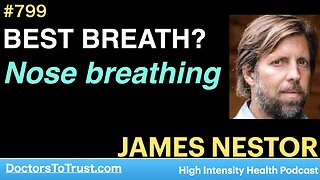 3:26
3:26
Doctors To Trust
1 year agoJAMES NESTOR 1 | BEST BREATH? Nose breathing
43 -
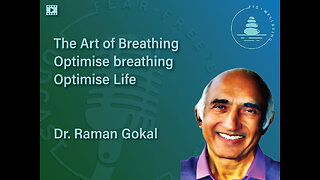 1:00:25
1:00:25
Fear-free Speakeasy
3 months agoThe Art of Breathing | Dr. Raman Gokal
77 -
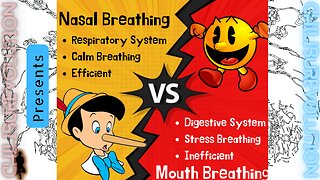 6:50
6:50
Chili Bu Revolution of the Mind, Body & Soul
1 year agoNasal Breathing VS Mouth Breathing
114 -
 48:47
48:47
Myers Detox
3 months agoScience of Breathing and Mouth Taping With Sachin Patel
168 -
 1:36:21
1:36:21
TheElwinRobinson
1 month ago'Buteyko Breathing Method' Most Controversial and Interesting Tenets | Rejuvenate Pod Ep. 36
49 -
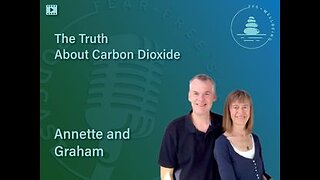 49:03
49:03
ffspeakeasy
3 months agoThe Truth About Carbon Dioxide | Annette and Graham Henry
17 -
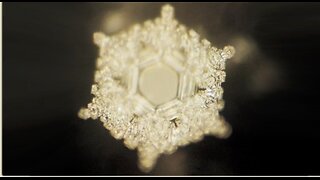 7:04
7:04
Infowars War Room With Owen Shroyer
5 months agoThe Miraculous Nature of Water Greg Reese
5.64K2 -
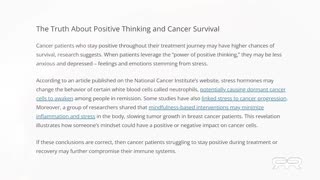 7:04
7:04
News from The Great Greg Reese
5 months agoThe Miraculous Nature of Water Greg Reese
1.88K -
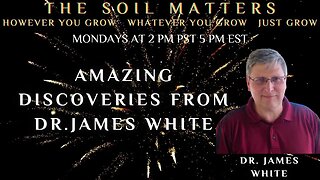 4:50
4:50
itsallaboutthebiology
11 months agoAmazing Discoveries From Dr. James White
93 -
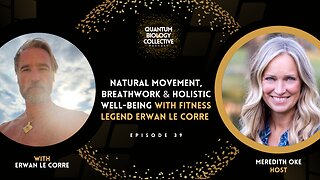 1:43:59
1:43:59
Quantum Biology Collective Podcast
9 months agoNatural Movement, Breathwork & Holistic Well-being with Fitness Legend Erwan Le Corre
77